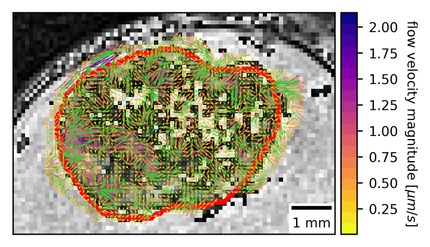4-in-1
Targeted gene suppression in cancer cells
Diagnosis and treatment in one go: Korean researchers led by Tae Gwan Park and Jinwoo Cheon have developed the basis for a four-in-one agent that can detect, target, and disable tumor cells while also making them macroscopically and microscopically visible. As they report in the journal Angewandte Chemie, their work involves magnetic iron oxide particles with a fluorescence dye, RNA fragments, and a special peptide attached. The peptide is present to specifically identify the cancer cells; the RNA fragments suppress the special cancer-cell genes, killing the cells. The magnetic particles act as a contrast agent for magnetic resonance imaging, and the fluorescence dye allows for microscopic imaging of the target cells.
In order to build a protein according to the genetic information in a cell, the gene on the DNA is read off and translated into a "stencil", mRNA, which is then used by the cell as a blueprint for the protein. The mRNA is a good point of attack to stop the synthesis of proteins required for tumor growth. To achieve this, siRNAs (small interfering RNAs) are introduced into the cell. These are short, double-stranded RNA fragments that bind specifically to the target mRNA. Inside the cell, a special protein complex binds to the siRNA, which unwinds and cleaves the mRNA. In this unprotected form, the mRNA is rapidly degraded by the cell.
When bound to nanoparticles, the siRNAs are easier to slip into cells. In order to specifically target cancer cells, the particles carry a short peptide, called RGD, which points the way: RGD strongly binds to an integrin, a membrane protein that is anchored to metastasizing tumor cells in much higher amounts than in healthy tissue. The integrins with RGD-equipped nanoparticles are actively brought into the cell interior with their cargo intact (receptor-mediated endocytosis).
The magnetic particles not only act as an aide for transport, they are also a contrast agent for MRI. This reveals where the tumors are, whether the particles are concentrating there, and how the treatment is progressing. If higher resolution is required, the fluorescence dye molecules come into play. In histological slides of tissue samples, they make it possible to see how the magnetic particles are taken up by individual cells an in which cell compartments they are concentrated.
Original publication: Jinwoo Cheon et al.; "All-in-One Target-Cell-Specific Magnetic Nanoparticles for Simultaneous Molecular Imaging and siRNA Delivery"; Angewandte Chemie International Edition, Published Online: 30 Apr 2009
Topics
Organizations
Other news from the department science

Get the analytics and lab tech industry in your inbox
By submitting this form you agree that LUMITOS AG will send you the newsletter(s) selected above by email. Your data will not be passed on to third parties. Your data will be stored and processed in accordance with our data protection regulations. LUMITOS may contact you by email for the purpose of advertising or market and opinion surveys. You can revoke your consent at any time without giving reasons to LUMITOS AG, Ernst-Augustin-Str. 2, 12489 Berlin, Germany or by e-mail at revoke@lumitos.com with effect for the future. In addition, each email contains a link to unsubscribe from the corresponding newsletter.

























































